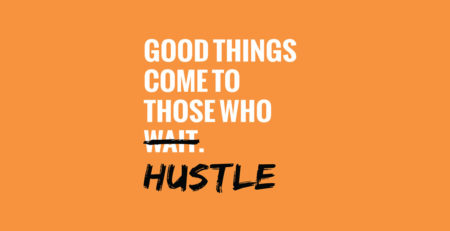Google Yourself
Many of my clients share one crucial misconception: they think they do not need a personal brand. Let us clear this up quickly, because in the digital age, everything aggregates. So, whether you know it or not, you’ve likely already got one, and you need one.
Our cell phones give us immediate access to more information than world leaders of the 1980s could access from any source. According to Peter Diamandis and Steven Kotler, authors of The Future is Faster Than You Think, “In 2009, the number of devices connected to the internet exceeded the number of people on the planet. By 2015, all this progress added up to 15 billion connected devices.” That’s double the number of humans on Earth in 2020.
Information about you is being collected and compiled whether you like it or not, all for the review of future colleagues, employers, investors, and clients. The amount of information that is publicly and readily available about you will only increase. Shouldn’t you be in the lead of the story all that information tells about you?
Let’s begin with a definition of branding:
“Core values, practices, integrity, customer experiences and impressions create the feeling and story of a brand. A brand lives in a sacred place, in the hearts and minds of consumers, and it drives engagement and purchasing behavior.”
–Theo Prodromitis, The Success Formula
Consider yourself the “product” that consumers buy into, and across industries “customers” will come in different forms – and in the digital information age, they will all have access to information about you.
So here are the 6 types of people who MOST need a personal brand.
1. Those with a common name or who might experience “name confusion”
If this is you, run to the computer immediately and get working!
The most urgent and serious cases include having a name in common with a criminal. You may believe that people will KNOW it is not you, but readers may still conclude that you are related to them. Neither is good for you. Consider setting yourself apart by using your middle initial or a complete middle name. If your full name is exactly the same as someone you don’t want to be confused with, consider hiring someone to help you.
Alternatively, for those with very common names like Kim Smith, use a middle initial or even full name to start building your own online personal brand. Or create a title or slogan that always accompanies your name to make your personal brand more distinctive. For example, “Kim Elizabeth Smith, The Surfing Guru” or “Tina Marie Jones, Iowa’s Healthcare Advocate.”
2. Entrepreneurs
As an innovator, creator or leader in business, people at every level will be Googling you. The most impactful thing you can do to build entrepreneurial success is to have a solid, significant digital footprint.
And do not limit yourself to a business footprint. These days there are higher demands on entrepreneurs to be socially responsible and active, and transparency should be a given in the choices you make and the causes you support. Even your donations to religious organizations can be tracked on the internet.
So be certain that there is plenty of information – professional and personal in nature – about you, your integrity, your expertise and potential to fill at least page one of a Google search of your name. Make sure that you stand by all that makes up your digital footprint.
3. Intrapreneurs
Intrpreneurs are managers within a company who promote innovative product development and marketing. This is a tricky category.
Many companies have employment clauses that ensure their ownership of any idea you create while employed there. This means intrepreneurs must promote the brand and innovations of the company they work for without taking personal credit for them.
As an Intrapreneur, you still need good personal public branding to stand out. You are unique and deserve to be recognized and easily found by other company employees, proud family members and potential future employers or investors. Consider your personal brand as a dynamic working resume that needs to be kept current.
4. Employees & Job Seekers
Most employees do not believe there is any reason to manage their personal brand, but this is a mistake.
Particularly if you don’t work in a marketing department, this term may be nebulous or foreign. One Executive Coaching client said, “Me? I am an employee of a big insurance company and no one is buying anything from me. Why in the world do I need to worry about that?”
Consider that average expected job tenure decreases every year. These are not the times where you can count on employment with one company to last you all the way until retirement.
Moreover, every person that works with you (perhaps for you) can Google you. When you were hired, the HR manager certainly Googled you, in addition to reading your meticulously curated resume.
Bottom line: If you want to stay relevant and competitive, add internet content that highlights your skills. You never know what opportunities you may miss if you don’t curate your own personal brand.
5. Community Leaders or Volunteers
Serving your community is a noble cause. Many of you donate time and energy to great organizations! Use your personal brand and an active digital footprint to help you reach more people, further your causes, and share your story and passion for philanthropy.
People are looking you up anyway. If you are a mom who volunteers at the local school and you want to run for a leadership position there – rest assured someone will check your digital trail.
Choosing to step into the limelight in any leadership position will make it imperative that people can see who you are and gather correct information to support your efforts. If this sounds like you, start to create and manage your personal brand.
6. Students
Most young people today are digital natives and can readily tackle a personal brand audit and create new, relevant content.
However, when I coach college students, they are often hesitant about what to post or create while they are still in school. Many feel like they are not experts, and don’t know what to say – but don’t let this stop you! My student-clients are incredibly interesting, involved, and inspiring. Their fresh perspectives on key issues may help potential employers understand their unique qualities.
I do not recommend blasting out controversial rhetoric on social media as a personal brand – for students or anyone else.
Be yourself, exercise your first amendment right to free speech. But do so with the understanding that what you say, write and post could have an impact on your future job opportunities. An HR professional at a Fortune 500 company who oversees 10,000 employees recently told me that all his hiring managers check out social media profiles before interviews.
In conclusion, there are more reasons and platforms to help you create, curate, and manage your personal online brand than ever before. The amount of information and opportunities for people to research you will continue to increase.
This eventuality is also an opportunity for you to tell your personal brand story and fine tune the narrative about you. Make sure to include the following topics, so that you are putting your best self forward into the world:
- Demographics and History: Who you are, where you come from.
- Values and Integrity: What you stand for.
- Dynamic Differentiation: What makes you different.
- Vision: Where are you going and how you are going to get there.
Light Your Fire,












Leave a Reply